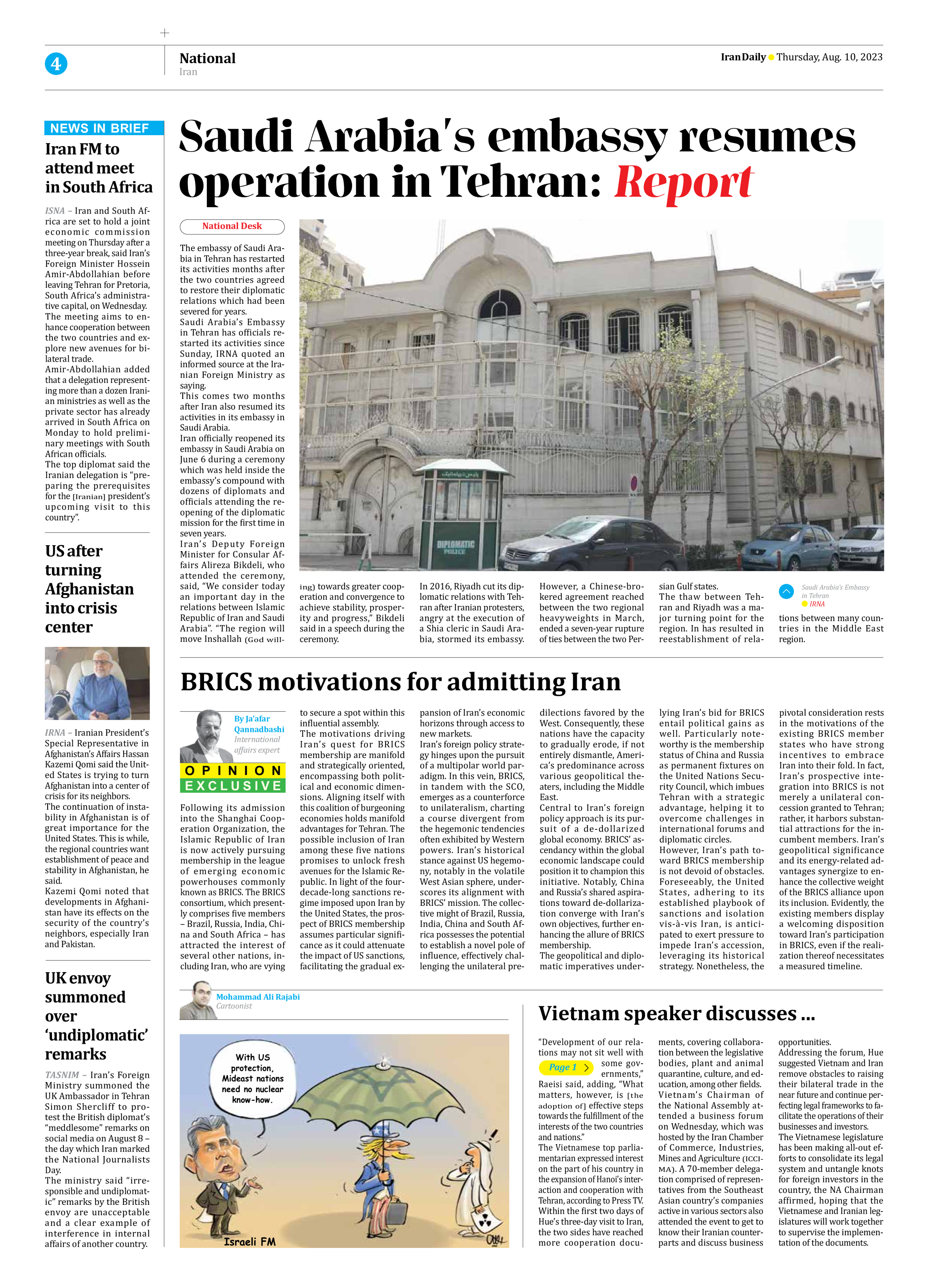
BRICS motivations for admitting Iran
By Ja’afar Qannadbashi
International affairs expert
Following its admission into the Shanghai Cooperation Organization, the Islamic Republic of Iran is now actively pursuing membership in the league of emerging economic powerhouses commonly known as BRICS. The BRICS consortium, which presently comprises five members – Brazil, Russia, India, China and South Africa – has attracted the interest of several other nations, including Iran, who are vying to secure a spot within this influential assembly.
The motivations driving Iran’s quest for BRICS membership are manifold and strategically oriented, encompassing both political and economic dimensions. Aligning itself with this coalition of burgeoning economies holds manifold advantages for Tehran. The possible inclusion of Iran among these five nations promises to unlock fresh avenues for the Islamic Republic. In light of the four-decade-long sanctions regime imposed upon Iran by the United States, the prospect of BRICS membership assumes particular significance as it could attenuate the impact of US sanctions, facilitating the gradual expansion of Iran’s economic horizons through access to new markets.
Iran’s foreign policy strategy hinges upon the pursuit of a multipolar world paradigm. In this vein, BRICS, in tandem with the SCO, emerges as a counterforce to unilateralism, charting a course divergent from the hegemonic tendencies often exhibited by Western powers. Iran’s historical stance against US hegemony, notably in the volatile West Asian sphere, underscores its alignment with BRICS’ mission. The collective might of Brazil, Russia, India, China and South Africa possesses the potential to establish a novel pole of influence, effectively challenging the unilateral predilections favored by the West. Consequently, these nations have the capacity to gradually erode, if not entirely dismantle, America’s predominance across various geopolitical theaters, including the Middle East.
Central to Iran’s foreign policy approach is its pursuit of a de-dollarized global economy. BRICS’ ascendancy within the global economic landscape could position it to champion this initiative. Notably, China and Russia’s shared aspirations toward de-dollarization converge with Iran’s own objectives, further enhancing the allure of BRICS membership.
The geopolitical and diplomatic imperatives underlying Iran’s bid for BRICS entail political gains as well. Particularly noteworthy is the membership status of China and Russia as permanent fixtures on the United Nations Security Council, which imbues Tehran with a strategic advantage, helping it to overcome challenges in international forums and diplomatic circles.
However, Iran’s path toward BRICS membership is not devoid of obstacles. Foreseeably, the United States, adhering to its established playbook of sanctions and isolation vis-à-vis Iran, is anticipated to exert pressure to impede Iran’s accession, leveraging its historical strategy. Nonetheless, the pivotal consideration rests in the motivations of the existing BRICS member states who have strong incentives to embrace Iran into their fold. In fact, Iran’s prospective integration into BRICS is not merely a unilateral concession granted to Tehran; rather, it harbors substantial attractions for the incumbent members. Iran’s geopolitical significance and its energy-related advantages synergize to enhance the collective weight of the BRICS alliance upon its inclusion. Evidently, the existing members display a welcoming disposition toward Iran’s participation in BRICS, even if the realization thereof necessitates a measured timeline.







